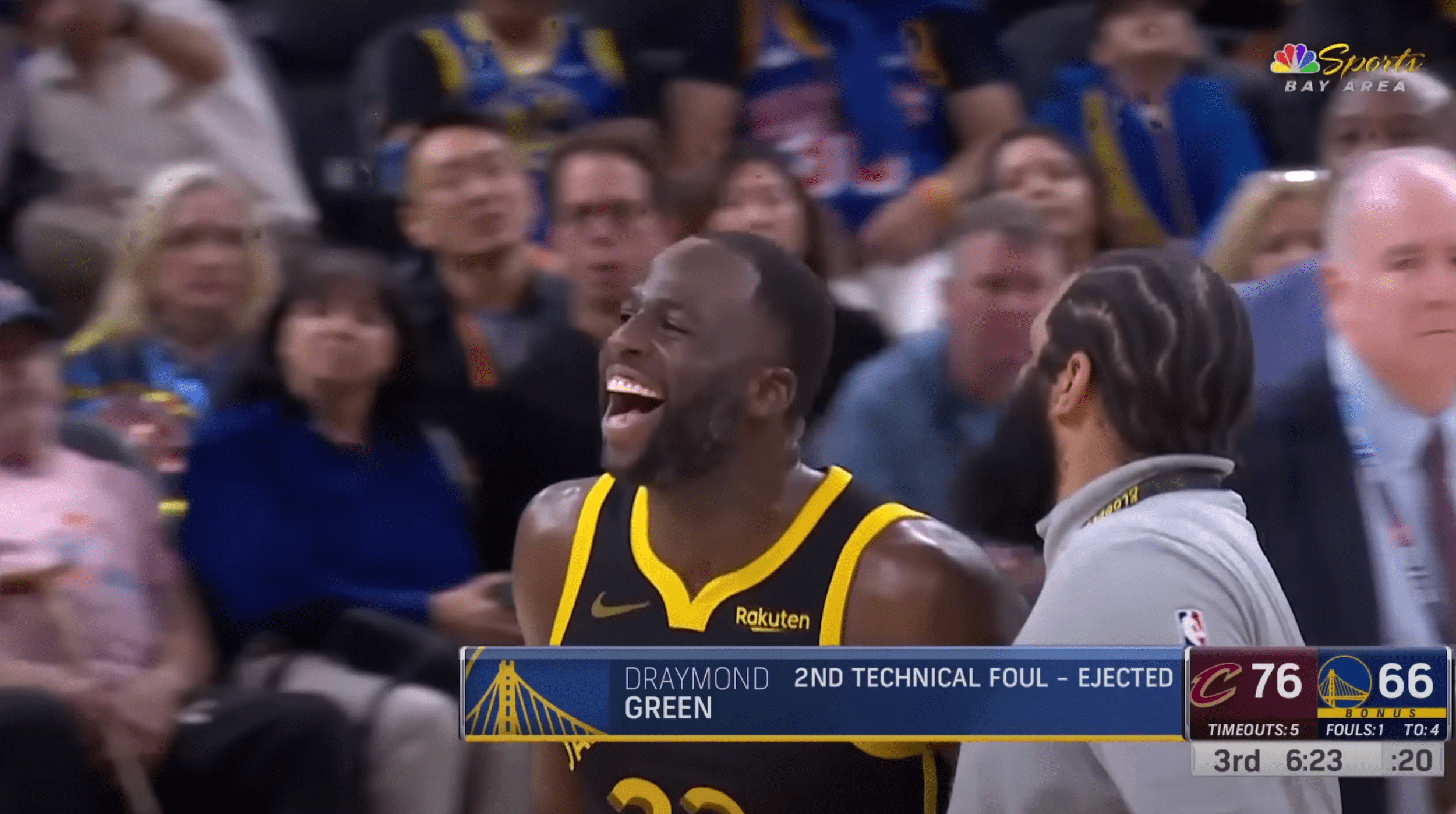The NBA rulebook says refs should avoid assessing technical fouls "whenever and wherever possible." It says that when technical fouls must be assessed, when absolutely necessary, it must be done "without delay or procrastination." It says that a technical foul "cannot be assessed for physical contact when the ball is alive," with exceptions only for "fighting fouls" or "physical taunting."
Let's use these criteria to check a particular sequence, from the Saturday night game between the Golden State Warriors and the visiting Cleveland Cavaliers. The Cavs are up eight points midway through the third quarter; Steph Curry misses a three-pointer from the top of the key, then unadvisedly chases the long rebound, which falls to Donovan Mitchell. Mitchell throws the ball ahead to Caris LeVert. LeVert bares down on Klay Thompson, Golden State's last defender; Andrew Wiggins and Draymond Green trail the play for the Warriors; Mitchell trails the play for Cleveland. As LeVert soars in for the layup, Green throws out a hip and an elbow and bodily checks Mitchell into the stands. The refs appear to have missed the contact, or misjudged it. Kevon Looney inbounds the ball to Green, who jogs it back the other way. Suddenly, Mitchell comes sprinting up into the front court and shoulder-charges Green in obvious anger. It's not a basketball play, and both players know it: Green and Mitchell square up, and a thousand bodies crash in between them to prevent anything fight-like from taking place.
What has happened, according to your understanding of the rules of basketball? To me, Green checking Mitchell into the stands is a flagrant foul, which the rulebook describes as unnecessary contact committed by a player against an opponent. Then, Mitchell sprinting back up the court to shoulder charge Green in an obvious act of escalation is also a flagrant foul. That the first foul precipitated the second shouldn't really matter, except to whatever report card the NBA gives to its referees. To me, both teams would then shoot free throws. A flagrant foul is supposed to reward possession to the team that was fouled, but since both teams were fouled, do a jump-ball at mid-court. This would've all made sense to me. In the entire sequence, watched at game speed, the foul that most stood out as egregious was Mitchell's shoulder charge into Green. That was very obviously a non-basketball foul.
The referees did not see it this way. After reviewing the sequence for a flagrant foul on Mitchell, they talked for a long time at the scorer's table and then ruled that the shoulder-charge was a common foul. They then explained that they'd rewound the tape and spotted Green's egregious hip-check, and determined that it was a foul. Instead of ruling it a flagrant foul for excessive contact during the run of play, they ruled it a technical foul. Because this was Green's second technical foul of the game, the referees ejected him from the game. Here's the entire sequence:
Green did a lot of not-mad guffawing and clapping as he left the court, but this was genuinely a surprising and counterintuitive ruling by the referees. "I had never heard this rule," said Warriors head coach Steve Kerr, after his team moped to a second home loss in three tries. "Apparently you can retroactively call a technical from two plays before, upon review. There's a lot of plays I'd like to go back to from three years ago. It was bizarre." Referees often look for what was described here as "precipitating" acts when reviewing potentially flagrant fouls, but this wasn't one guy clubbing another guy and immediately receiving a retaliatory shove; the eight seconds it took for Mitchell to deliver his shoulder charge are worth a third of a 24-second shot clock. This is at least an unusually forgiving stretching of the concept of precipitating action.
It's unlikely that players will view this as an avenue to recourse for the many little injustices of a given NBA game, but that's more or less what happened here: Mitchell felt he'd been wronged and that referees had missed it, and because he handled that frustration by angrily retaliating, he gave referees an opportunity to correct their mistake. This was a risk worth taking: Green's ejection meant the removal of the one Warriors player showing anything like a pulse Saturday night.
Green naturally thinks he's been treated unfairly. "I am the same person that got suspended from the NBA Finals for flagrant fouls that were all called from after the game," Green said after the game. And this was for sure a weird call. But as with the flagrant fouls of the 2016 NBA Finals, this is Green insisting that it is wrong and fucked-up for anyone to hold him accountable for being a violent asshole at any moment after the one when he'd decided he'd gotten away with it. The technical foul was confusing, as was the ruling that Mitchell's equivalent act was a common foul, but these situations can in general be avoided by not acting like a brutal dickhead all the time.






